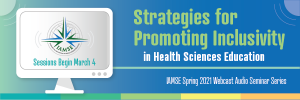
[The following notes were generated by Michele Haight, PhD.]
Karen Eley Sanders, MS, EdD, Vice Provost for College Access, Charlotte Baker DrPH, MPH, CPH, Richard Vari, PhD, Senior Dean for Academic Affairs, Joanne Greenawald MD, Director of Problem-Based Learning, Emily M. Holt Forest, MA, Director Counseling and Academic Enrichment Services, Virginia Tech Carilion School of Medicine
Strategies to Recognize and Address Implicit or Explicit Bias in Small Group Teaching
Dr. Eley Sanders presented a video of a small group learning session in which an administrator and medical student actors portrayed a small group learning facilitator and group participants respectively. The video showed group introductions for a problem-based learning opening session. Dr. Eley Sanders encouraged the webinar participants to consciously reflect upon their impressions, thoughts and feelings during the video presentation.
Upon completion of the video, Dr. Eley Sanders conducted a debriefing session in which she initiated a discussion on “microaggressions.” She described a system of bias. She explained how stereotypes can lead to prejudice. Acting upon prejudice results in discrimination. Microaggressions are an extension of discrimination, prejudice and bias.
- Bias is an inclination for or against something.
- Stereotypes are generalizations about a person which do not permit for individual differences or variations.
- Prejudice is an opinion, pre-judgment or attitude about a group or its members.
- Discrimination is behavior that treats people unequally because of their group memberships. This often begins with negative stereotypes and prejudices.
- D. Wing Sue classifies microaggressions as “ brief, everyday exchanges that send denigrating messages to certain individuals because of their group membership.”
Dr. Eley Sanders described eight different categories of microaggressions:
- Alien in One’s Own Land
- Second Class Citizen
- Ascription of Intelligence
- Pathologizing Values/Communications Styles
- Color Blindness
- Assumption of Criminal Status
- Denial of Racism/Sexism/Homophobia/Transphobia
- Myth of Meritocracy
Microaggressions can have short term and long terms impacts such as the following:
- Feeling of “onlyness” and loneliness
- Physical avoidance
- Disengaging
- Physiological stress
- Anxiety and/or Depression
- Sleep Difficulties
- Inability to Focus
- Dropping Out
- Patients who experience microaggressions are less likely to follow through on treatment plans, and less likely to return to a medical professional who shows bias.
Dr. Eley Sanders noted that the persons committing microaggressions might be otherwise well-intentioned and unaware of the impact of their words, but this does not minimize the impact of their words.
Dr. Charlotte Baker guided the group to view the video again, pausing to analyze each example of a microaggression. She provided alternative comments and strategies to avoid inappropriate comments. She noted that some people might not be offended by certain comments, but she cautioned that this might not always be the case.
Dr. Baker reviewed other situations that commonly occur in medical education and can lend themselves to microaggressions.
Drs. Eley Sanders and Baker concluded the session by responding to questions posed by the webinar participants.
- How do you recommend a bystander respond to a microaggression that has been observed in the classroom? Simply say “Ouch” or “Wow.” These responses provide the opportunity for discussion. Give everyone the opportunity to learn from the incident.
- Is it appropriate to acknowledge that you might have difficulty pronouncing someone’s name, but you will make every effort to learn how to pronounce it? Yes, acknowledge this and you might work with the student to perfect your pronunciation.
- Participants noted that the examples in the video were more “macro” than “micro” aggressions. Eley Sanders stated that this is a correct observation and clarified that microaggressions can be further broken down to micro-assaults, micro-insults and micro-invalidations.
- Baker noted that it is important to establish relationships with students, so we need to be constantly aware of “how” we ask questions.
- What are your recommendations for navigating the student/faculty power differential in conversations? Create a “safe space” in the learning environment for learners to have these types of discussions. Acknowledge and apologize to the learner for any missteps and apologize in the group (if this is where the misstep occurred) in order to role model the behavior we seek from our learners.
- Should students be called out for committing microaggressions? Absolutely yes. We have to help them learn appropriate behaviors and engagement.
- Baker and Eley Sanders recommended reading the following article: “My Name is Not Interpreter,” Montenegro, R. JAMA, 2020, 323(17):1700-1701. https://doi.org/10.1001/jama.2020.2976